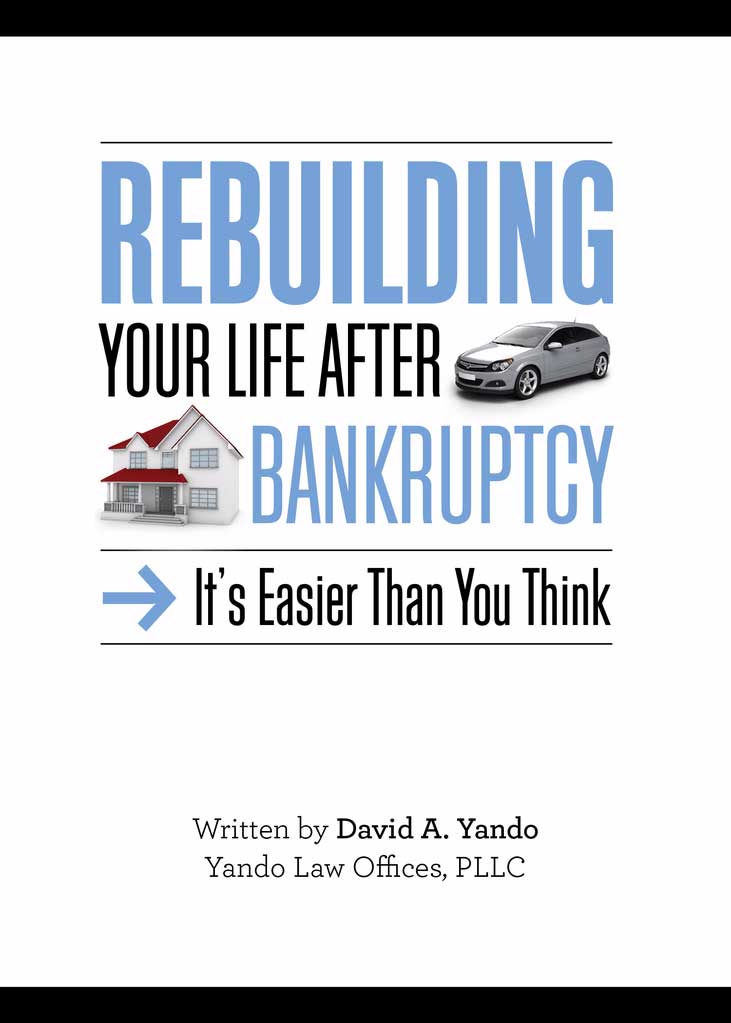CHAPTER 13 DEBT ADJUSTMENT ATTORNEY
Chapter 13 Lawyer Serving Tacoma and Pierce County
Understanding Chapter 13 Bankruptcy
Chapter 13, Adjustment of Debts of an Individual With Regular Income, also known as the Wage Earner Plan, is designed for an individual debtor who has a regular source of income, that enables the debtor to keep a valuable asset, such as a house that may be in foreclosure or that may have excess equity, and allows the debtor to propose a “plan” to repay creditors over time – usually three to five years. Chapter 13 is also used by consumer debtors who do not qualify for chapter 7 relief under the means test due to excessive income. At a confirmation hearing, the court either approves or disapproves the debtor’s repayment plan, depending on whether it meets the Bankruptcy Code’s requirements for confirmation. Chapter 13 is very different from chapter 7 since the chapter 13 debtor makes payments to creditors, through the trustee, based on the debtor’s anticipated income over the life of the plan. Unlike chapter 7, the debtor does not receive an immediate discharge of debts. The debtor must complete the payments required under the plan before the discharge is received. The debtor is protected from lawsuits, garnishments, and other creditor actions while the plan is in effect. The discharge is also somewhat broader (i.e., more debts are eliminated) under chapter 13 than the discharge under chapter 7. Another advantage of chapter 13 is that it allows individuals to reschedule secured debts (other than a mortgage for their primary residence as the monthly payment itself cannot be changed, but repayment of past-due mortgage payments may be rescheduled over the life of the plan) and extend them over the life of the chapter 13 plan. Doing this may lower the payments. Chapter 13 also has a special provision that protects third parties who are liable with the debtor on “consumer debts.” This provision may protect co-signers. Finally, chapter 13 acts like a consolidation loan under which the individual makes the plan payments to a chapter 13 trustee who then distributes payments to creditors. Individuals will have no direct contact with creditors while under chapter 13 protection.
Benefits of Chapter 13 Bankruptcy
Chapter 13 does not require you to give up any of your secured property and allows you to catch up on delinquent house and car payments through the plan. Chapter 13 is most beneficial for clients who are facing a foreclosure or repossessions. You will be able to keep your home, car, furniture, jewelry, and other valuables unless you choose to liquidate them yourself to repay your debts. Chapter 13 does take longer than Chapter 7, but it allows you to remain in control and continue making payments, which can have less of an impact on your credit score. Once your repayment period is up, all remaining debts will be discharged and you will be able to focus on credit restoration.
Chapter 13 allows you to pay court fines and traffic tickets through the plan in order to have your suspended driver’s license reinstated.
When an individual files a chapter 13 petition, a Trustee is appointed to administer the case. The chapter 13 Trustee both evaluates the case and serves as a disbursing agent, collecting payments from the debtor and making distributions to creditors.
Filing the petition under chapter 13 “automatically stays” (stops) most collection actions against the debtor or the debtor’s property. Chapter 13 also contains a special automatic stay provision that protects co-debtors. Unless the bankruptcy court authorizes otherwise, a creditor may not seek to collect a “consumer debt” from any individual who is liable along with the debtor. Consumer debts are those incurred by an individual primarily for a personal, family, or household purpose.
Individuals may use a chapter 13 proceeding to save their home from foreclosure. The automatic stay stops the foreclosure proceeding as soon as the individual files the chapter 13 petition. The individual may then bring the past-due payments current over a reasonable period of time. Nevertheless, the debtor may still lose the home if the mortgage company completes the foreclosure sale under state law before the debtor files the petition. The debtor may also lose the home if he or she fails to make the regular mortgage payments that come due after the chapter 13 filing.
Between 20 and 50 days after the debtor files the chapter 13 petition, the chapter 13 Trustee will hold a meeting of creditors.; creditors rarely appear at this meeting. During this meeting, the trustee places the debtor under oath, and both the trustee and creditors may ask questions. The debtor must attend the meeting and answer questions regarding his or her financial affairs and the proposed terms of the plan. The plan will later be confirmed at a confirmation hearing, which the debtor is usually not required to attend, and the debtor will make monthly payments to the trustee until the plan is completed, at which time the court will enter the discharge order.
Retain a Tacoma Bankruptcy Attorney
Set up a free case evaluation with a Tacoma bankruptcy lawyer from Washington Fresh Start today to discuss your options. Chapter 13 may be the most beneficial option for you! We also understand that bankruptcy is not for everyone, however, and can counsel you in any alternatives to bankruptcy, as well. Bankruptcy attorney David Yando has more than 30 years of debt relief experience and can provide solid bankruptcy counsel. Contact us as soon as possible to learn more about how we can help.

